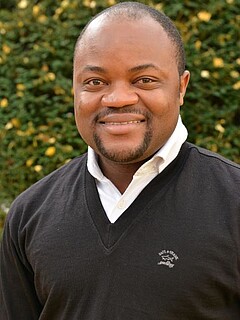PhD students 3rd cohort

Giresse Macaire Teikeu, M.A.
giresse.macaire.teikeu@uni-jena.de
Curriculum Vitae
2009-2012 Bachelor of Arts in English and German Language and Literature at the University of Yaoundé 1
2013-2015 Dipes II, Two-stage Training in German as Foreign Language after the Bachelor´s Degree at the Higher Teachers Training College of Yaoundé
2013-2018 Master of German Studies at the University of Yaoundé 1. Focus: Memory – Representations – Identity – Mastering the past.
2013-2018 Tutor and student advisor at the German Department of the University of Yaoundé 1
2016-2019 German Teacher in Cameroonian Secondary Schools
2019-2020 Exchange student at the Global and European Studies Institute at the University of Leipzig. Focus: Global History, Memory Studies and transnational History of culture
2019-2020 Scholarship holder of the funding program Erasmus + International
2020-2021 Research assistant at the Chair of Modern German Literature and Memory Research with Prof. Dr. Philomène Atyame (Head of Department) at the University of Yaoundé 1
2021 Student assistant at the exhibition stand “Study and Research in Germany / DAAD-Cameroon”
Since October 2021 PhD student and research associate at the Research Training Group “The Romantic Model”
Since winter semester 2022/2023: Mentor of the Mentoring Programme of the International Office at Friedrich-Schiller-University Jena
PhD project
German romanticism in Africa. National improvement and cultural anchoring in colonized Cameroon
The so-called “civilization mission” of the German building middle class and its promoted romanticization of the world (Novalis) has also found its way through the colonization in the African context. The romanticism was therefore transported in Africa with the discovery of new natural phenomena, new peoples with new cultures and traditions. The German missionary Hermann Skolaster, who worked for years as a pastor/priest and teacher in Cameroon, planned already in his literary works romantic thinking in the socio-cultural and political context of Cameroon.
In my dissertation project, I therefore investigate the breadth and the reception of the German romanticism in the literary and consciousness-developing context of Africa. Specifically, it is about the investigation of romantic modes of representation in colonial literature about Cameroon from two perspectives: the projected representation of the romanticism on Cameroon by the German missionary and author Hermann Skolaster and the idealizing, transfiguring representation by the Cameroonian authors David Mbanga Eyombwan and Paul Tchakouté. Based on the German building bourgeoisie and their romantic world perception and ideas, and also on the postcolonial theories, the first part of the work will examine the scope and the reception of romantic thinking in Africa, with examples being taken from the texts of some German romanticists. In view of the specific motifs that appear in the materials to be analyzed, the concept of “black romanticism” will be also addressed. In the second part of the project, various genre-specific representations and manifestations of the romanticism will be examined in the selected literary texts by Hermann Skolaster, David Mbanga Eyombwan and Paul Tchakouté. It can thus be emphasized that motifs of the romanticism are processed in the colonial literature about Africa, precisely about Cameroon. It will be therefore analyzed how this thinking has contributed to the development of African culture and identity and, in this regard, to the national improvement of Cameroon. It is also interesting to examine how the presented romantic categories have modeled the reinforcement of negritude and African nativism in literature. It will then be investigated to what extent romantic elements are rooted in the cultural memory of Africa in general, and what meaning this literature can have in the contemporary Cameroonian context. Since the texts of Cameroonian authors were written in the context of remembrance, their contribution to historical awareness about the German colonial era and romanticism will also be analyzed.
Publications
Monografs
- Literatur und Prognose: Zur Darstellung gesellschaftlicher Wirklichkeiten im Roman Die Verwirrungen des Zöglings Törleβ von Robert Musil. München: Grin Verlag GmbH 2017.
- Erinnerung und Selbstauffassung: Untersuchung der Identität österreichischer Juden in Thomas Bernhards Heldenplatz. München: Grin Verlag GmbH 2018.
- Zur Inszenierung des Traumas. Eine Untersuchung zu Jurek Beckers Bronsteins Kinder und Thomas Bernhards Heldenplatz. München: Grin Verlag GmbH 2019.
Articles
- Missionsliteratur zwischen kolonialer und religiöser Wertschätzung – Hermann Skolasters Im Banne der Ngil. In: Klaus Hock et al. (Hg.), Mission in Film und Literatur. Grenzüberschreitungen: Plots – Akteur:innen – Kontexte, Evangelische Verlagsanstalt, Leipzig, 2024, 221-231.
- Romantische Ländlichkeit in der deutschen Kolonialliteratur. Heinrich Nordens „Im Banne eines Seelenräubers“, in Zeitschrift für Germanistik, Heft 3, 2024, S. 644-660 [open access, DOI: https://doi.org/10.3726/92175_644].
Varia
- Romantik in der Praxis V: Volksmärchen neu interpretieren – Die Brüder-Grimm-Festspiele in Hanau, in: Modell Romantik. Variation - Reichweite - Aktualität 2024.
Talks and presentations
- Analysis of Family Trauma in Jurek Becker’s Novel Bronsteins Kinder; Institut für Anglistik, Philosophische Fakultät, Universität Leipzig, (16.01.2020)
- Transgenerationelles Gedächtnis und familiäres Trauma. Eine Untersuchung zu Jurek Beckers Bronsteins Kinder, 69th National Postgraduate Colloquium in German Studies, Institute of Modern Languages Research | School of advanced study University of London (26.11.2021)
- Romantische Ländlichkeit in der deutschen Kolonialliteratur. Heinrich Nordens Im Banne eines Seelenräubers; Workshop Rurale Romantik, 02./03. Februar 2023, org. Prof. Dr. Claudia Stockinger, Humboldt-Universität zu Berlin.
- Missionsliteratur im Spannungsverhältnis zwischen kolonialer und religiöser Wertschätzung. Hermann Skolasters Im Banne der Ngil; Fachtagung: Grenzüberschreitungen – Plots, Akteure, Kontexte. Missionserzählungen in Literatur und Film, Stiftung des öffentlichen Rechts an der Martin-Luther-Universität Halle-Wittenberg, 30.März bis 1. April 2023, org. Prof. Dr. Claudia Jahnel.
- Dokumentartheater als Gattung der literarischen Geschichtsschreibung. Eine gedächtnistheoretische Annäherung an Kum´a Ndumbes III. Ach Kamerun! Unsere alte deutsche Kolonie; vorgetragen im Rahmen des Seminars „Neuere Deutsche Literatur“ von Dr. Sandra Folie, Friedrich-Schiller-Universität Jena, am 07.06.2023.
- Deutsches Kaiserreich und koloniale Migration: Selbstbehauptung und Interkulturalität im Roman Der Junge aus Duala von Dualla Misipo; Workshop (Hybrid) Dualla Misipo: »Der Junge aus Duala«. Literaturwissenschaftliche Perspektiven auf ein frühes Werk der schwarzen deutschen Literatur, 13.-15.11.2024, org. Dr. Sandra Folie und Dr. Gianna Zocco, Leibniz-Zentrum für Literatur- und Kulturforschung Berlin.